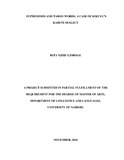| dc.description.abstract | This works is a discussion of the relationship between informativity and interpretation of
euphemism as well as taboo words and the social – cultural context in which they are
used by speakers of Kikuyu as a first language. The theoretical framework used is
politeness theory by Brown and Levinson (1987). The objectives of the study were to
identify and describe the euphemisms and taboo words that are popularly used by
speakers of Kikuyu, to establish the informativity and semantic attributes of euphemisms
and taboo words in Kikuyu language and to analyze the pragmatic and social functions of
euphemized taboo words which are used by speakers of Kikuyu. Data for the study was
collected from twenty male informants and twenty female informants from Kabete area
of Kiambu County. This was primary due to the fact that the research is a native speaker
of the Gi-Kabete dialect spoken in the Kiambu County. The results of the research
showed that in order to avoid embarrassment and face – loss, Kikuyu people try to look
for substitutions that can hide or cover up the harmonious power of taboo words.
Consequently, euphemisms are employed to replace offensive expressions that can cause
harm and shame to the speaker of Kikuyu language. | en_US |

